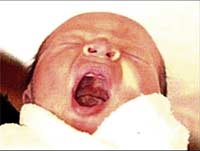A group of experts from the University of Bristol, UK, suggests that a genetic defect may prevent young children from restarting their lungs when they stop breathing.
 |
| Currently, scientists have not yet identified the causes of sudden infant death syndrome (SIDS) during sleep. (Photo: VNN) |
The researchers discovered brain cells capable of transmitting nerve impulses related to a child’s ability to gasp but not breathe normally.
They believe that a lack of these cells could lead to some unexplained cases of sudden death in infants, particularly while the child is sleeping.
The Bristol research team collaborated with experts from the United States to find that various types of brain cells are needed for a child to breathe normally, but a specific type known as pacemakers is necessary for the gasping reflex.
The researchers found that these pacemaker cells depend on a type of protein that can form small holes in the cell wall.
When oxygen levels drop, these holes enlarge, allowing sodium ions to enter the cell, triggering the gasp reflex.
If these holes are blocked, the child’s ability to gasp will be lost, leading to the heart stopping and resulting in death.
Thus, a genetic defect related to the presence of this protein in brain cells may be the “culprit” behind sudden infant death syndrome.
Professor Walter St John, a member of the research team, stated: “Our findings indicate that the gasping reflex, which is breathing in emergency situations, operates through a mechanism different from the regular breathing control.”
If a child stops breathing normally, the protective system should activate the gasp reflex. Gasping enables the child to receive oxygen, after which the heart resumes beating and breathing returns to normal.
Sudden infant death syndrome is one of the leading causes of death in children under one year old, with 349 cases reported in the UK in 2004 alone.
However, the death rate has decreased by 75% since 1991, following a public awareness campaign that encouraged parents to place their infants on their backs while sleeping.
Huong Cat


















































